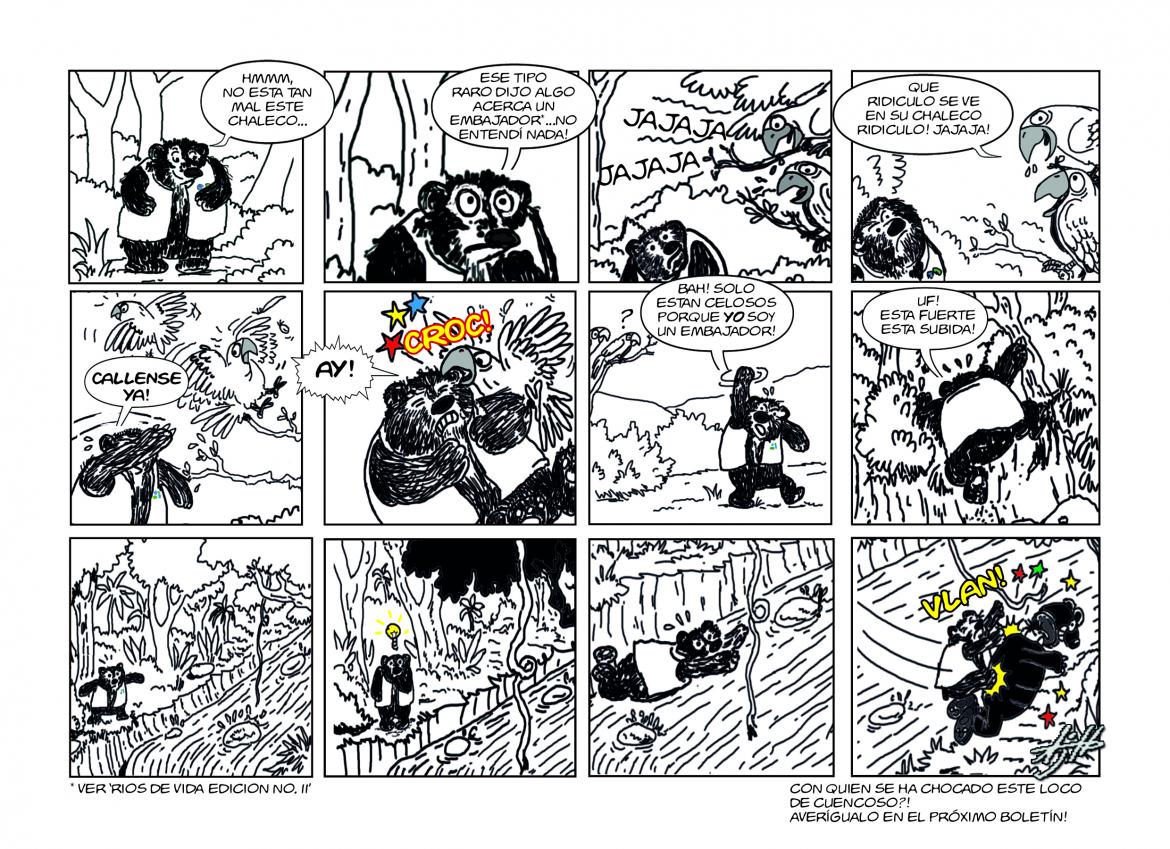Escalating impact: Rare’s new work strategy in Colombia
 Rare seeks to inspire change so that people and nature thrive. Under this mission, Rare hopes in Colombia to contribute to the construction of a society where people feel proud of their natural resources and protect them.
Rare seeks to inspire change so that people and nature thrive. Under this mission, Rare hopes in Colombia to contribute to the construction of a society where people feel proud of their natural resources and protect them.
Thanks to more than 40 years of work experience in 6 continents and more than 50 countries, Rare knows that human activities are the main force for landscape change, resulting in the loss of biodiversity and the degradation of ecosystems throughout the world. The Colombian government, the private sector and non-governmental conservation organizations have invested millions of dollars to conserve biodiversity and ecosystem services in the country, however, the rates of deforestation increase every year in most of the biogeographic regions of the country. Colombia, as it happens in the rest of Latin America.
Rare, is committed to contribute to the conservation of Colombian biodiversity, and for this proposes a vision of integrated management of the landscape that takes into account the heterogeneous demographic, political and socioeconomic conditions that are an integral part of the composition and functioning of ecosystems . This is particularly relevant in a post-conflict scenario where the migration and return of populations to previously unoccupied areas are generating additional pressure on natural resources.
Rare’s work methodology, called pride campaigns for watersheds, has water basins as an intervention unit; they are intended to address biological, environmental, social and behavioral aspects that ensure the sustainability of long-term actions. This is achieved by co-creating environmental solutions with local communities, upstream and downstream, inspiring a sense of co-responsibility and creating new social norms of sustainable behavior towards the environment.
To achieve this Rare proposed:
- Simplify the intervention model and reduce its cost, which also means increasing the return on investment (ROI) of each program.
- Promote the adoption, propagation and financing of projects, and
- Attract private investment to accelerate the adoption and sustainable financing of integrated watershed management solutions with measurable environmental, social and economic benefits.
In this sense, Rare’s simplified intervention model contemplates the creation of capacities in local grassroots organizations (municipalities, rural aqueducts, water companies, among others) in the methodology, and directly intervene in the territory through strategic alliances.
If you want to know more about Rare’s new work strategy and how to be part of it, contact us ( comunicaciones@rare.org ).
Watershed conservation and water governance in the framework of the Pride Campaigns for Watersheds
A basin can be defined as a territory where ecosystems and communities converge; Geographically it is a natural drainage system that can be superficial or underground. Most of the river basins are occupied by
human populations, all with interests on natural resources; interests that are normally reflected in pressures on them. Sometimes these interests are competitive and require, as a first step, the establishment of the vocation of the soil and its carrying capacity of the basin. An additional layer of complexity is reflected in the economic and social needs of the communities that inhabit the territories and whose way of life depends totally or partially on the direct use of natural resources. The existence of divergent interests, on the same territory, requires dialogue and negotiation. This dialogue must prevail for an important resource such as water.
A current issue, which is fundamental for the conservation of watersheds, is the governance of water. The Organization for Economic Cooperation and Development (OECD), defines a series of principles, so that public policies on water are effective, efficient and create trust between actors, in addition to allowing their participation. In this last issue, they highlight the need to incorporate integrity and transparency practices for greater accountability and confidence in decision-making; promote the involvement of interested parties so that they can contribute in an informed and results-oriented manner; promote governance frameworks to manage arbitrations between water users, from different areas and generations; and that the results from the monitoring of public policies be shared with the public.
The trust and participation of the social actors of the territory is indispensable in a country like Colombia that is living a new chapter of its history. Rural development is a priority at the national level, where the rapprochement and work with the municipalities that for a long time were marginalized, is preponderant. The review of environmental and water policies is among the pillars of peacebuilding. In this sense, the reference framework provided by water governance presents interesting and necessary guidelines to strengthen confidence in the territories and crystallize the participation of communities. Both components, essential for conserving watersheds.
The pride campaigns promoted by Rare with local partners provide a platform through which the bonds of trust in a territory and the participation of the community in decision making are strengthened, local governance instances are created, strengthens social participation and decisions are made with the community; Additionally, Rare’s new work model for Colombia incorporates new elements such as gender equity, capacity building for local governments, tools to ensure transparency of processes and social monitoring, among others.
If you are interested in learning more about the governance component of our projects, please contact us, we will gladly share information.
Reference: Board of Directors of Public Governance and Territorial Development, OECD. (2015). OECD Principles of Water Governance. 24 p.
World Water Forum
Rare achieved an outstanding participation in the 8th World Water Forum that took place in Brasilia from March 18 to 23 of this year. This forum takes place every 3 years, and is considered the main international event in the water sector in the world.
Organized by the World Water Council and the Brazilian government, the Forum brought together more than 10,000 people to discuss and share knowledge on 1) how to accelerate the implementation of the Sustainable Development Goals (SDGs) and the 2030 Agenda; 2) what types of actions allow to accelerate the adoption of technical solutions that promote the integral management of water resources; 3) how to promote the formation of strategic alliances between different sectors, taking into account gender equity.
The Rare Watershed Program was recognized as a successful case to answer these questions and we were invited to present a case study in three important sessions within the forum. These sessions were:
- Transformation of the integrated management of water resources for the 2030 agenda : convened by IUCN, in this session we discussed practical ways to foster collaboration among the different stakeholders in the basin for the management and integral conservation of water resources.
- Green and gray infrastructure: Can integrated solutions help to avoid conflicts and facilitate cooperation among the different users of the basin? under the leadership of Forest Trends, in this session we present our “Pride Campaigns” as a methodology that promotes governance and encourages the participation of different actors, helping to avoid conflicts and facilitating cooperation and sustainability of long-term processes.
- Best practices for water governance in cities, watersheds and countries at the invitation of the OECD Water Governance Initiative, Rare presented its watershed program as a success story for water governance. This case study was included in a publication that includes the 54 best practices of water governance in the 5 continents. This publication and an online profile can be accessed through the OECD website. http://www.oecd.org/cfe/regional-policy/evolving-water-governance-practices.htm
Sustainable coffee production and reciprocity in La Paila
 Isabel Echeverry is one of the ex-students of the group “Nacederos”, name taken from the “tree that calls water”. For four years, Isabel undertook the mission of inspiring the citizens of La Paila, in the municipality of Zarzal, and agricultural producers located in the highlands, to conserve forests and water sources.
Isabel Echeverry is one of the ex-students of the group “Nacederos”, name taken from the “tree that calls water”. For four years, Isabel undertook the mission of inspiring the citizens of La Paila, in the municipality of Zarzal, and agricultural producers located in the highlands, to conserve forests and water sources.
When Isabel began her investigation in 2014, the people of La Paila did not know where the water they were drinking came from. Today the citizens of La Paila know that they are connected to other lands through the Rio La Paila and that by taking care of the forests in Bugalagrande and Seville they guarantee that their families do not lack water. In the words of Doña Gladys, member of the management committee of the Campaign for the Pride of La Paila on behalf of water users: “I was born and raised here but I had never met Seville or up there until Isabel invited me. I was very very apathetic with nature and walks by mosquitoes. Now I protect myself and I like to make trips to the countryside and to know other aqueducts “.
While touring the village of Paila, it is possible to see that the Campaign for Pride of the La Paila basin, developed by CVC and Rare, continues to inhabit this place and transformed the public space into a permanent exhibition of wall drawings and messages that remind to the inhabitants of La Paila who should be proud and grateful for the natural wealth that is upstream.
Don Farley, member of the management committee of the Campaign for the Pride of La Paila and official of the aqueduct, says he is excited to participate in reforestation mingas: “I can already say that I left my quota of having planted not one but 80 small trees up there. That will favor the next generations, my grandchildren and great-grandchildren. “
Although La Paila is a town with a “sugar vocation”, defined by the presence of Ingenio Río Paila y Colombina, its water comes from coffee highlands. That is why the coordinator Isabel Echeverry signed 3 new Reciprocal Agreements for Water for the conservation or productive reconversion of 6.3 hectares in strategic lands for the conservation of the San Marcos, Coloradas and Tetillal streams. Owners of coffee farms such as the Parra Family have already started to bet on the implementation of a system of ecological benefit of coffee, which allows a significant saving of water, maintaining the high quality that characterizes Colombian coffee.
Estas acciones buscan generar reciprocidad entre las comunidades de la cuenca alta y aquellas en cuenca baja que se benefician del agua, generando apropiación y sostenibilidad local a los esfuerzos de conservación.
Lanzamiento del grupo de campañas “Quimera” de la CVC en el Valle del Cauca
Del 2 de febrero al 16 de marzo de este año, se lanzaron en siete cuencas del Valle del Cauca, las Campañas por el Orgullo enfocadas a la conservación de los bosques que garantizan el agua de cinco centros urbanos, los manglares de tres comunidades pesqueras en el municipio de Buenaventura y de tres humedales del municipio de Jamundí. A lo largo de estos eventos de movilización comunitaria participaron alcaldes, instituciones gubernamentales, funcionarios de la Corporación Autónoma Regional del Valle del Cauca (CVC), instituciones educativas, culturales y Organizaciones No Gubernamentales (ONGs) teniendo un aproximado de 1000 participantes.
Durante los lanzamientos, se desarrollaron actividades culturales, desfiles en los cascos urbanos y la presentación de las especies insignia (botargas) que representan la fauna de cada lugar. Cabe destacar que los propietarios de los predios de las partes altas de la cuenca, usuarias domésticas de agua de las zonas urbanas, pescadores y pescadoras (audiencias meta de los proyectos) participaron durante los eventos. La canción regional, así como varios materiales de las campañas, fueron repartidos a los asistentes quienes se mostraron entusiasmados de ser parte del inicio de estos proyectos de mercadotecnia social que conservarán los ecosistemas de la región.
Humor
Alan Hesse
Las aventuras de Cuencoso

Oportunidades
Curso en línea “Educación sobre el cambio climático”. Más información: https://goo.gl/FkAeXQ
Competition “Climate change needs behavioral changes”. More information:
https://solutionsearch.org/contest/climate-change-needs-behavior-change
OECD Water Governance Principles. Document: https://goo.gl/ZLS8Je